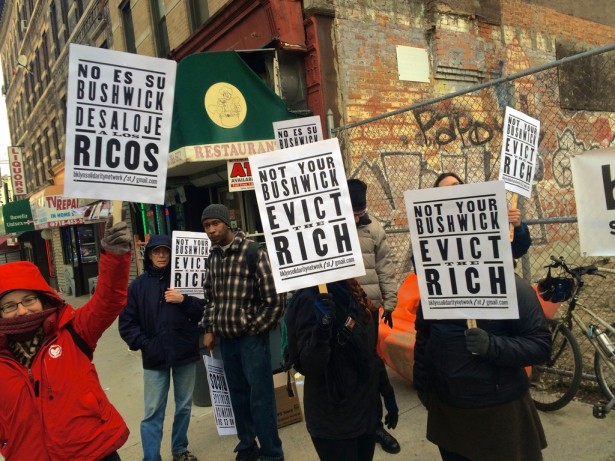
Protesters in the working-class Brooklyn neighborhood of Bushwick demonstrated against gentrification on March 5 outside a lot formerly occupied by a brewery and set to be turned into luxury apartments.
The rally was organized by the Brooklyn Solidarity Network, a local activist group that works on housing and workers’ issues. The group is aiming to stop the proposed condos from being built, claiming that they will encourage the further gentrification of an already-rapidly gentrifying neighborhood.
“Read [Property Group] and Rabsky [Group], two property developers, are building a huge yuppie village here in Bushwick. They got it rezoned by Diana Reyna, a former councilwoman, and Antonio Reynoso, the current councilman, is supporting this,” said an anonymous member of the Brooklyn Solidarity Network. “They did it, arguing that it would be for affordable housing, but it was all a ruse. Affordable housing in New York City is a lie since they’re trying to push all the poor people out. So we’re here to say that this development has to stop, and we’re going to stop it. And we’re not going to stop until Reynoso de-zones it or resigns.”
The site in Bushwick belonged to the Rheingold Beer company until 1981, when it was torn down. In December 2013, local housing advocates, the then-Council member Diana Reyna, and the then-owner of the site, Read Property Group, succeeded in getting several blocks at the site rezoned for residential development. Read Property Group pledged that 30 percent of the apartments would be set aside for affordable housing, and the housing advocates who worked on the plan were confident that Read Property Group would fulfill its promise. That agreement was non-binding, though, and did not apply to anyone who bought any part of the site from Read Property Group.
In October 2014, Read Property Group sold a chunk of the site to Simon Dushinsky’s Rabsky Group for $53 million. Now, whether or not Rabsky Group will stick to the original promise to include affordable housing in their development of the site remains to be seen. Meanwhile, Reyna’s successor, Council member Antonio Reynoso still approves of the plan but has been trying to get Rabsky Group to commit to the affordable housing pledge made by Read Property Group.
“The scope of this project threatens to move at least 2,000 high-income tenants into the area, forcing rents and necessities up to astronomical levels,” the Brooklyn Solidarity Network said in a statement. “The brutalities exacted upon tenants will only get worse. The gentrification process is spiraling out of control, and we need to draw the line here. This development must not be built.”
Brooklyn’s Bushwick section has become an exemplar gentrified neighborhood in recent years. Its rapid gentrification has even been parodied on Saturday Night Live. Located next to Williamsburg, another notorious example of gentrification, Bushwick’s rate per square foot of retail space went from $24 in 2001 to $70 in 2011. The average one-bedroom Bushwick apartment rented for $800 per month in 2007. By 2010, that rent went up to $1,300 per month.
Things have only grown worse since then, as Williamsburg’s cost-of-living has increased, leaving Bushwick’s relatively cheaper cost-of-living looking even more appealing to gentrifiers. As more affluent people move into the neighborhood, developers are looking to profit by building luxury apartments, masquerading some as “affordable housing,” and ultimately pricing out the neighborhood’s poorer, longtime residents.
The Brooklyn Solidarity Network says this is what is happening with the development of the Rheingold site and that it’s all just another step in the wider gentrification of Bushwick as a whole.
“On paper, everybody wins: Property developers make a pretty penny, and politicians get praised for revitalizing the neighborhood,” the Brooklyn Solidarity Network said in a statement. “But it is the residents of Bushwick who pay the real cost. Landlords and developers drive out people who make low wages, and those who can hold on a few years can barely afford basic amenities. Between the changing prices and cultural shift, the consistent message driven home is: Bushwick is not for you.”
The group gathered on the corner of Bushwick Avenue and Montieth Street, right next to the lot currently being developed, on Saturday at around 4 p.m. They unfurled a banner stating “Destroy Condos, Not Communities” while individuals participating in the protest held signs stating “Not your Bushwick! Evict the rich!” in English and Spanish. Protesters handed out flyers to neighborhood residents with information on the development and stood in the street, with signs in hand, encouraging motorists to stop and find out what was going on. The protesters often received honks of support from passing cars and got many people to stop their cars and ask how they could help.
After two hours, cops in a police van pulled up and began questioning protesters. Not long after that, the protesters decided to wrap things up. The Brooklyn Solidarity Network later released a video explaining what was going on at the Rheingold Brewery site and encouraging other Bushwick residents to help “liberate our community.”
Ideally, the Brooklyn Solidarity Network would like to see the community itself take control of the site and decide what is built there. They hope to get longtime residents to realize what is happening to Bushwick and take action.
“Everyone in the neighborhood has been really receptive. People are really tired of it,” said a Brooklyn Solidarity Network member. “We intend to put enough pressure on the politicians and on the developers to stop this thing in its tracks. If we do stop it, we think that decisions like this should be made through the neighborhood, through community control, through neighborhood councils. And we’re proposing to start setting up structures for neighborhood councils so people can become the main decision-makers in their communities.”
